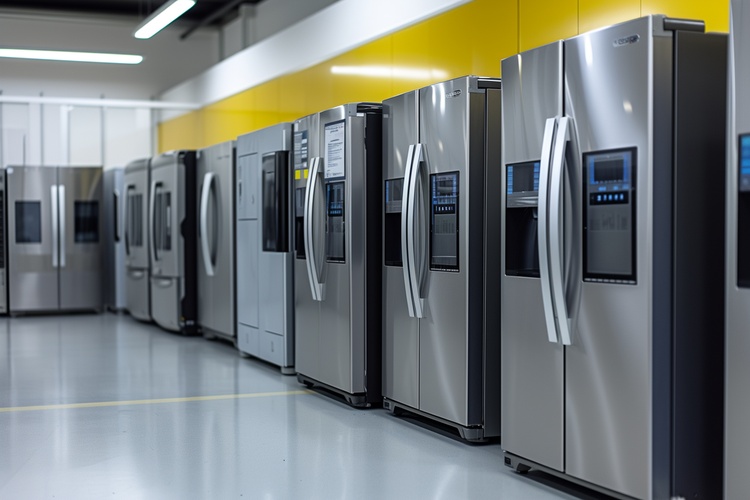The Importance of Ice Maker Filters in Refrigerators: Ensuring Clean and Fresh Ice
In today's modern kitchens, refrigerators with built-in ice makers have become increasingly popular. These convenient appliances provide a steady supply of ice for cooling beverages and other uses. However, to maintain the quality and safety of the ice produced, it's crucial to pay attention to an often-overlooked component: the ice maker filter. This article will explore the significance of ice maker filters, their function, and why regular replacement is essential for your refrigerator's performance and your family's health.

What is an ice maker filter and how does it work?
An ice maker filter is a specialized component designed to remove impurities from the water used to produce ice in your refrigerator. Typically located within the refrigerator’s water supply line, this filter acts as a barrier, trapping contaminants such as chlorine, sediment, and other particles that may be present in your home’s water supply. By doing so, it ensures that only clean, filtered water is used to make ice, resulting in better-tasting and safer ice cubes.
Why is regular ice filter replacement important?
Regular replacement of your refrigerator ice filter is crucial for several reasons. Over time, these filters accumulate debris and contaminants, gradually becoming less effective at removing impurities from the water. This can lead to a decline in ice quality, with potential off-flavors or odors. Moreover, a clogged filter can reduce water flow, affecting the ice maker’s performance and potentially causing damage to the system. By replacing the filter as recommended by the manufacturer, you maintain optimal ice quality and protect your appliance’s longevity.
How often should you replace your ice maker filter?
The frequency of ice maker filter replacement depends on various factors, including your water quality, ice consumption, and the specific recommendations of your refrigerator’s manufacturer. Generally, most manufacturers suggest replacing the filter every six months. However, if you have hard water or notice a decline in ice quality sooner, you may need to replace it more frequently. It’s essential to consult your refrigerator’s user manual or contact the manufacturer for precise guidelines tailored to your specific model.
What are the signs that your ice filter needs replacement?
Several indicators can signal that it’s time to replace your refrigerator ice filter. These include:
-
Noticeable changes in ice taste or odor
-
Cloudy or discolored ice cubes
-
Slow ice production or reduced ice quantity
-
Strange noises coming from the ice maker
-
Visible sediment or particles in the ice
If you observe any of these signs, it’s advisable to replace your ice filter promptly to ensure continued ice quality and proper functioning of your ice maker.
How to choose the right ice filter replacement for your refrigerator?
Selecting the correct ice filter replacement is crucial for maintaining your refrigerator’s performance and ice quality. Here are some tips to help you choose the right filter:
-
Check your refrigerator’s model number and consult the user manual for compatible filter models.
-
Consider using OEM (Original Equipment Manufacturer) filters for guaranteed compatibility and performance.
-
Look for filters certified by reputable organizations like NSF International or the Water Quality Association.
-
Compare filter specifications, such as contaminant removal capabilities and flow rates.
-
Read customer reviews and ratings to gauge real-world performance and reliability.
What are the best ice filter replacement options available?
When it comes to ice filter replacements, several reputable brands offer high-quality options for various refrigerator models. Here’s a comparison of some popular ice filter replacement products:
| Product Name | Compatible Brands | Key Features | Cost Estimation |
|---|---|---|---|
| EveryDrop by Whirlpool Ice and Water Refrigerator Filter | Whirlpool, Maytag, KitchenAid, Amana | NSF certified, reduces 73 contaminants | $40 - $50 |
| GE RPWFE Refrigerator Water Filter | GE, Hotpoint | NSF certified, reduces chlorine taste and odor | $45 - $55 |
| Samsung HAF-CIN Refrigerator Filter | Samsung | NSF certified, reduces sediment and chlorine | $35 - $45 |
| LG LT1000P Refrigerator Water Filter | LG | NSF certified, reduces pharmaceuticals and pesticides | $40 - $50 |
| Frigidaire EPTWFU01 PureSource Ultra II Ice and Water Filter | Frigidaire, Electrolux | NSF certified, reduces lead and mercury | $35 - $45 |
Prices, rates, or cost estimates mentioned in this article are based on the latest available information but may change over time. Independent research is advised before making financial decisions.
In conclusion, the ice maker filter plays a crucial role in ensuring the quality and safety of the ice produced by your refrigerator. Regular replacement of this essential component not only guarantees clean and fresh-tasting ice but also protects your appliance’s performance and longevity. By understanding the importance of ice filters, recognizing when to replace them, and choosing the right replacement options, you can enjoy high-quality ice and maintain your refrigerator’s optimal functionality for years to come.




